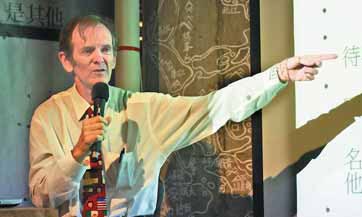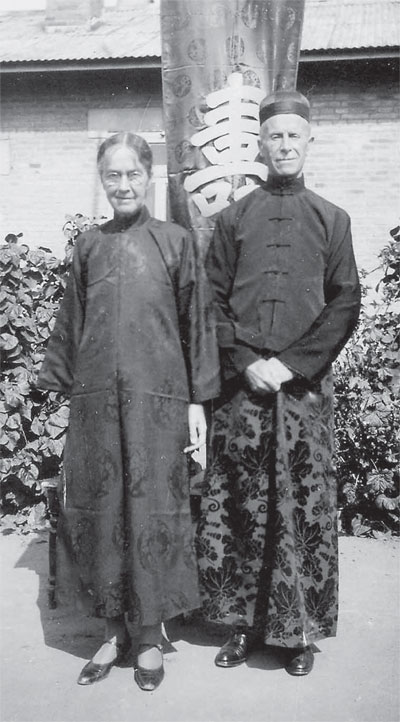Tracing grandfather's footsteps
Updated: 2013-04-16 07:59
By Xu Jingxi (China Daily)
|
||||||||
|
Mark O'Neill at an event promoting his book, Frederick: The Story of My Missionary Grandfather, in Guangzhou, Guangdong province. Zou Zhongpin / China Daily |
|
Frederick O'Neill and his wife in traditional Chinese clothes in Faku, Liaoning province, where they stayed to establish a church, school and hospital. Provided to China Daily |
Journalist Mark O'Neill thinks his destiny and connections with China started with his grandfather, he tells Xu Jingxi in Guangzhou.
After a tempestuous two-month voyage, Frederick O'Neill finally landed in China on Oct 30, 1897. Chilly rains, muddy roads and a wagon greeted the then-27-year-old missionary who had left his hometown of Belfast, the industrialized capital of Ireland. Three years later, the young man arrived at Faku in Liaoning province, where he was commissioned as pastor by the Presbyterian Church of Ireland. He was to stay in the rural county for the next 42 years, persisting through turbulence, war and epidemics.
Almost as soon as he arrived, he had to flee on another wagon to Vladivostok in Russia when the tide of sentiment turned against foreigners during the Boxer Rebellion (1900).
Bullets whistled by him all the way, but it was typhoid that downed him at the refugee camp. O'Neill returned to Faku after staying at the camp for only a month because he "shouldered obligations for Chinese parishioners".
In Faku, he struggled to keep the local church going, along with its school and hospital when Northeast China became the battlefield between the Russian and Japanese (1904-1905), and when the county was invaded by the Japanese in 1931.
Neither war nor the pneumonic plague sweeping across Northeast China during the winter of 1910 was able to scare away O'Neill. He was finally forced to say goodbye in 1942 when the Japanese declared war against the Allies by bombing Pearl Harbor.
All these stories would have been buried in time if Mark O'Neill, Frederick's grandson, had not decided to trace his grandparent's footsteps through China, North Ireland, France and Japan, and finished his biography.
The experienced journalist, who's currently freelance writer, says he did not start out with the intention of publishing a book on history.
"I was just curious as to why my grandfather chose to endure the long separation with his children back in Belfast and stay in China most of his lifetime," says O'Neill, who never met his grandfather.
His father, estranged from his grandfather by the long separation, seldom talked about this "mysterious" figure.
A job opportunity in Hong Kong took Mark O'Neill to China in 1978. One month after O'Neill's arrival, Deng Xiaoping announced the opening-up and reform policy.
The journalist was assigned to work in Beijing in 1985. And in the spring of 1986, Chinese government opened 240 cities to foreigners. Faku was in the list.
O'Neill was finally able to visit the county that his grandfather had worked and lived all those years ago.
"It seems as if my grandpa had been leading me all the way to China. My connection to the country might be destined," O'Neill says.
While uncovering his grandfather's stories, he has also written his own about China. He was one of the first foreign reporters in the country and worked on the mainland for 16 years. He married a Chinese and has settled in Hong Kong.
The 63-year-old China hand answered all our questions in Mandarin rather than his native English.
Luo Xunzhi, O'Neill's wife, also an ex-journalist, has accompanied her husband throughout his 26-year-long journey. The couple has visited Faku three times.
They have gone through all available missionary heralds that had mentioned O'Neill's grandfather at the Presbyterian Church of Ireland's headquarters in Belfast.
They visited the Chinatown in Paris, looking for anyone who knew about his grandfather's volunteer work in helping Chinese laborers sent to military factories in Europe during World War I.
"The project was time- and money-consuming. And it was difficult to find a publisher. But we gradually developed a sense of responsibility to make people know what O'Neill's grandfather and many other missionaries did for China when we found that these good deeds were being forgotten," Luo says.
The church established by O'Neill's grandfather in Faku had been turned into a gymnasium, and the sight of ping-pong tables having replaced the church pews had upset O'Neill and his wife during their first visit to Faku in 1986.
But in 2009, on their third visit to Faku, they finally saw the church restored as a place of worship.
These were not the only changes O'Neill witnessed in Faku and in China in the past 30 years.
Faku was an underdeveloped rural county shut away from the outside world when O'Neill first visited. Mule carts ran beside his car along the stony roads, and children surrounded him, fascinated by the first foreigner they had ever seen. They were especially curious about O'Neill's big nose.
"Faku must have been more underdeveloped and closed when grandpa went there. What great efforts he spent blending into the community and winning local hearts," says O'Neill, who showed us photos in his book of his grandparents dressed in traditional Chinese attire.
O'Neill's grandfather could have led a comfortable middle-class life in Ireland, but even wars couldn't make him leave Faku.
"Honestly, I wouldn't make the same choice if I were him, and at first I couldn't figure out what made him that strong-willed and determined about missionary work," O'Neill says.
He finally found the answer on the grateful faces of the people he met at the Faku church. His grandfather had been motivated not just by his faith and calling but also by the spirit of love.
Zhang Hongxia, a Chinese pastor in her 30s, gave O'Neill and his wife the warmest welcome when the couple revisited Faku in 2009. She told O'Neill that his grandfather had built Faku's first public school and showed him his grandfather's Chinese calligraphy on the wall of the church and the bed he had shared with his Chinese friends.
"We are lucky to have your grandfather come and bring the gospel," O'Neill quotes Zhang as saying in the book. "He devoted all his love to Faku. We will never forget it was your grandfather who established the church, whatever it will be like in the future."
Contact the writer at xujingxi@chinadaily.com.cn.
(China Daily 04/16/2013 page18)

 In Photos: 7.0-magnitude quake hits Sichuan
In Photos: 7.0-magnitude quake hits Sichuan
 Li Na on Time cover, makes influential 100 list
Li Na on Time cover, makes influential 100 list
 FBI releases photos of 2 Boston bombings suspects
FBI releases photos of 2 Boston bombings suspects
 World's wackiest hairstyles
World's wackiest hairstyles
 Sandstorms strike Northwest China
Sandstorms strike Northwest China
 Never-seen photos of Madonna on display
Never-seen photos of Madonna on display
 H7N9 outbreak linked to waterfowl migration
H7N9 outbreak linked to waterfowl migration
 Dozens feared dead in Texas plant blast
Dozens feared dead in Texas plant blast
Most Viewed
Editor's Picks

|

|

|

|

|

|
Today's Top News
Live report: 7.0-magnitude quake hits Sichuan, heavy casualties feared
Boston suspect cornered on boat
Cross-talk artist helps to spread the word
'Green' awareness levels drop in Beijing
Palace Museum spruces up
First couple on Time's list of most influential
H7N9 flu transmission studied
Trading channels 'need to broaden'
US Weekly

|

|









